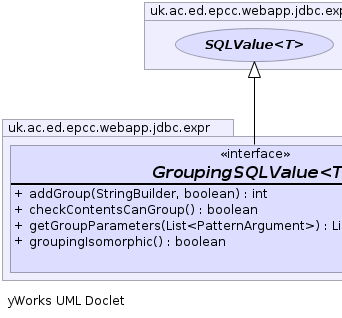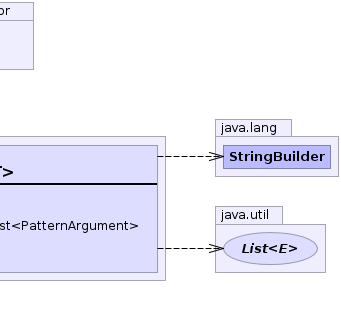-
- Type Parameters:
T- type ofSQLValue
- All Known Subinterfaces:
- DateSQLExpression, FieldSQLExpression<T,X>, FieldValue<T,X>, NestedSQLValue<T,N>, SQLAccessor<T,R>, SQLExpression<T>, WrappedSQLExpression<T>
- All Known Implementing Classes:
- AbstractSelfSQLValue, AliasSQLValue, ArrayFuncExpression, BinaryExpression, BinarySQLValue, BooleanFieldExpression, CaseExpression, CastDoubleSQLExpression, CastLongSQLExpression, CompareSQLExpression, CompositeIndexedSQLValue, ConcatSQLExpression, ConstExpression, ConstIndexedSQLValue, CountDistinctExpression, DateDerefSQLExpression, DateFieldExpression, DateSQLValue, DerefSQLExpression, DistinctCountSQLValue, DoubleConvertSQLValue, DurationConvertSQLValue, DurationFieldValue, DurationSecondConvertSQLValue, DurationSQLExpression, FieldExpression, FuncExpression, IndexedFieldValue, IntConvertSQLValue, LabellerSQLValue, LengthExpression, LocateSQLExpression, LongConvertSQLValue, MillisecondSQLValue, MysqlDateConverter, MysqlMillisecondConverter, MysqlSQLHashExpression, MysqlTimestampDiffExpr, NumberFieldExpression, PostgresqlDateConverter, PostgresqlMillisecondConverter, RemoteSQLValue, RoundSQLExpression, SelfIdExpression, SelfSQLValue, SQLSelectValue, SQLValuePatternTransform, StreamDataFieldExpression, StringConvertSQLExpression, StringConvertSQLValue, StringFieldExpression, TimestampDateFieldExpression, TupleSelfSQLValue, TypeConverterSQLValue, TypeFilterProducerSQLValue, TypeProducerFieldValue
public interface GroupingSQLValue<T> extends SQLValue<T>
A variant ofSQLValuewhich is legal to use for group-by clauses. This allows the class to generate an alternative SQL fragment. This allows complex transformations that do not change the grouping result to be optimised. Not allSQLValues can be used to implement a group-by so this interface needs to be implemented explicitly though there is a default implementation that works for most simple cases. If the SQL representation of theSQLValueis a literal constant it is required to implement this to suppress the group-by clause as literal constants are illegal in group-by clauses but won't actually change the grouping.- See Also:
SQLGroupMapper-


-
-
Method Summary
All Methods Instance Methods Default Methods Modifier and Type Method and Description default intaddGroup(java.lang.StringBuilder sb, boolean qualify)Add the group-by clause to a query.default booleancheckContentsCanGroup()return false if this instance is not able to perform grouping.default java.util.List<PatternArgument>getGroupParameters(java.util.List<PatternArgument> list)Get the parameters for a group-by clause.default booleangroupingIsomorphic()Is there always a one-to-one mapping between groups and values-
Methods inherited from interface uk.ac.ed.epcc.webapp.jdbc.expr.SQLValue
add, getParameters, getRequiredFilter, makeObject
-
-
-
-
Method Detail
-
addGroup
default int addGroup(java.lang.StringBuilder sb, boolean qualify)Add the group-by clause to a query. Note this can be a null operation in which case it will return zero.- Parameters:
sb-qualify-- Returns:
- actual number of fields added
- Throws:
CannotGroupException
-
getGroupParameters
default java.util.List<PatternArgument> getGroupParameters(java.util.List<PatternArgument> list)
Get the parameters for a group-by clause.- Parameters:
list-- Returns:
- modified list
-
checkContentsCanGroup
default boolean checkContentsCanGroup()
return false if this instance is not able to perform grouping.- Returns:
-
groupingIsomorphic
default boolean groupingIsomorphic()
Is there always a one-to-one mapping between groups and values- Returns:
-
-